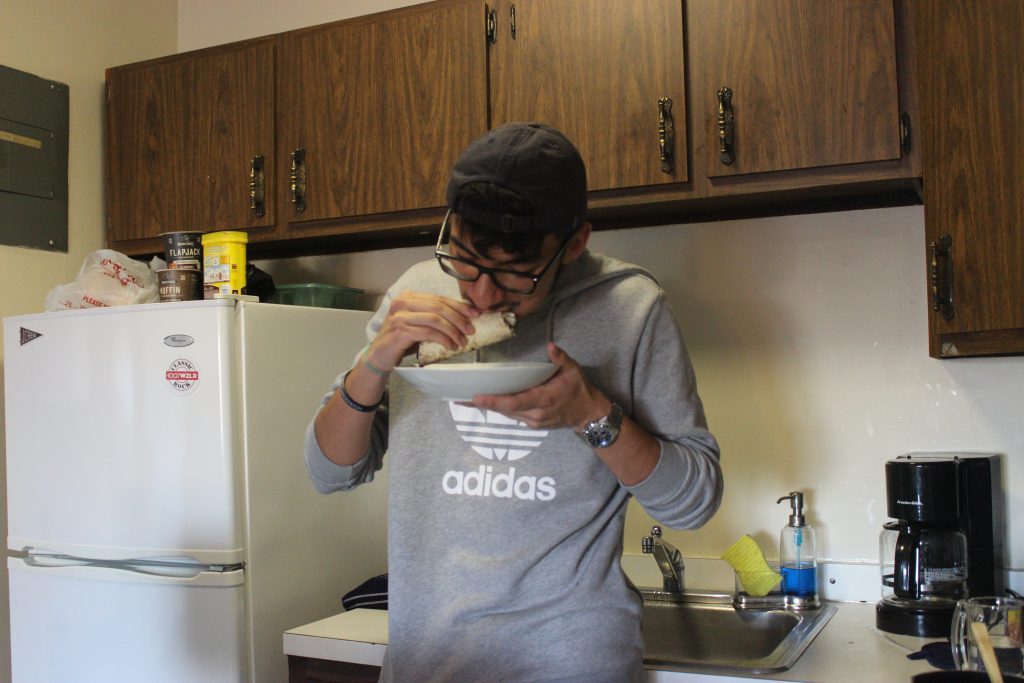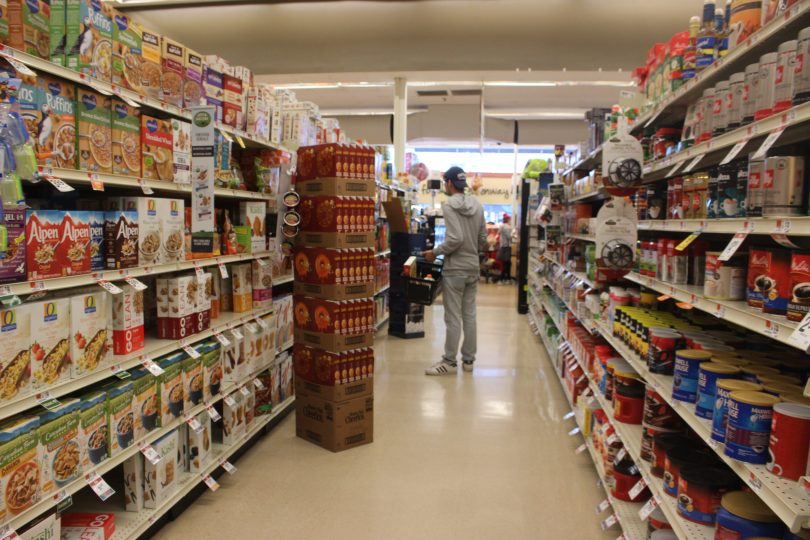By Marylu Bautista
BU News Service
BOSTON – William Estrada, 20, grabs a small grocery basket heads towards the canned goods section at the Star Market on Commonwealth Avenue. He points out the Goya canned beans on sale for 88 cents. As a first-generation, low-income student, Estrada says he is barely covering Boston University’s tuition with scholarships and loans.
So, he skips the meal plan at BU and instead relies on canned food and simple, inexpensive food like rice and beans to survive.
Estrada’s situation is not unique. A new survey of college students found that 36 percent of university students reported some form of “food insecurity” – lack of steady access to groceries or meals. The Temple University report was based on a survey of more than 20,000 students at 35 public and private universities.
Estrada has found creative ways to shop. He often skips chicken or beef, but when he doesn’t, he splits the items with his roommate to subsidize the cost. When Estrada is running low on money for groceries, he cancels his Netflix subscription until the next paycheck.
His family’s financial situation is tough. His mother was recently laid off, so Estrada hesitates to ask his parents for money. But, when he does go back home to Chelsea, he brings his mother’s Guatemalan homemade dishes.
“It’s been really difficult sometimes. I am not just someone who wants to spend money on food just to survive and then not enjoy the rest of my life,” he said.

BU does not have a campus food pantry, but Estrada said it would be a big help to him.
Surrounding universities such as Emerson College and the University of Massachusetts Boston have successful on-campus food pantries. UMass’s food pantry, U-Access, hopes to increase the access to food for UMass Boston students. According to the university’s website, U-Access offers free weekly grocery and toiletries bag to their students.
Emerson’s food pantry, Single Stop, offers its students nonperishable food, and nutritional frozen meals. For students who cannot stop by the office for the nonperishable food or frozen meals, Single Stop offers a mobile food pantry.
Paul Riel, an associate vice president of auxiliary services at Boston University said in an in-person interview that there is no data on food insecurity at BU and a food pantry on campus would fall under the student activities office.
The activities consultant from the student activities office, Meghana Dwaraka, said through email that the “office is not involved directly with addressing food insecurity.” According to her, there are currently no food pantries for students on campus.
Riel’s department is aware of the issue of food insecurity on campus and is interested in exploring the issue.
“If our campus is any indication of what other campuses are you can expect that there is a percentage of students on our campus that are impacted by food insecurity,” said Riel.
Riel’s office is currently working on developing an app or website in which students can go online and share their dining points or meal plans with other students who need them. Other universities such as Northeastern and Massachusetts Institution of Technology have similar programs on their campuses.
There is currently no release date for the program, but Riel is committed to making sure the program is successful and respects students’ dignity and confidentiality.
For some students who struggle to afford groceries, staying anonymous is important due to the negative social stigma that comes with being “food insecure.” According to Lauren Betz, of the company Food for All, a Boston group devoted to fighting hunger and food waste, young people either in high school or college will not use their school’s resources and will opt for not eating dinner to avoid the negative stigma around not being able to afford food.
“Our mission is making quality food accessible to everyone and empowering and promoting vendors who are socially responsible in the process,” said Betz.
Betz also said she believes Food for All is an alternative way for students to combat their lack of food without worrying about the stigma. The free app connects consumers to lower-priced meals, which would otherwise be thrown away. The app provides affordable meals for their consumers and prevents restaurants from wasting food.
According to Betz, Food for All has recently created a donation model. The donation model encourages their participating restaurants to donate their monetary proceeds made from Food for All to the Greater Boston Food Bank, which distributed approximately 60.7 million pounds of nutritious food to people from the community. The food bank is opened to everyone including college students.
There are two Greater Boston Food Banks less than a mile away from Boston University’s campus, but there are no flyers on campus promoting the food banks. Students such as Estrada who would benefit from the food pantry are likely unaware of their existence.
As an undergraduate at Amherst College, Anthony A. Jack would have also benefited from a food pantry. As a first-generation, low-income student, Jack, struggled to afford food. Fast forward 15 years, and Jack is now an education professor at Harvard University doing a study on low-income students at elite colleges.
Jack said that due to his transparency about his own struggle with food insecurity, students felt comfortable talking to him. Jack looked at a small group of 103 undergraduate, lower-income students at elite colleges and discovered that lack of food “was one of the biggest hurdles that college students face.”
According to Jack, lack of information about resources is an issue when combating food insecurity. He also said he believes there needs to be a central hub of information for students.
“We need greater system-wide understanding of the problem, so college and universities as a whole as a system of institution needs to be more aware of what obstacles their students are facing when it comes to securing basic necessities,” Jack said.








